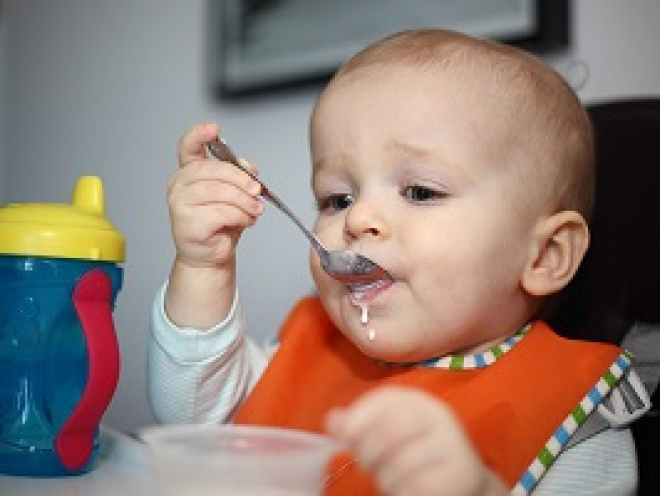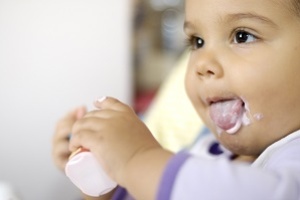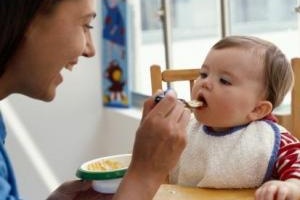Once your baby is six months old, they will be ready for their first foods. It can be daunting so here are some tips get you started.
Your baby is about to embark on an exciting adventure of new tastes and textures. It’s helpful to remember though that their main source of nutrition will be their usual milk up until the age of one year old (NHS, 2019).
You can pick from a couple of different methods to introduce solids to your baby to solids. Either traditional spoon feeding or baby-led weaning, or a combination of them both is possible.
Whichever method you choose, it might take your little one time to get used to their first foods. Your local Introducing your baby to solids course through NCT could give you confidence at this stage.
Whatever you do, you’ll want to learn the basics. Here are some tips to help you get started with feeding your baby their first foods:
1. Make sure your baby is comfy
Sit your baby upright facing the table, either on your lap or in their highchair (Rapley and Murkett, 2010). Make sure they are steady and can use their hands and arms freely.
You may wish to put down a ‘messy mat’ on the floor, as many babies enjoy throwing their food.
Make sure you test any hot food before offering it to them.
2. Start out small
Start by offering your baby just a few pieces or teaspoons of food once a day. If you are using a spoon, wait for your baby to open their mouth before offering it to them.
Let your baby enjoy touching and exploring their first foods for flavour and texture. Don’t worry if your baby hasn’t eaten much – what they eat over the course of a week is more important.
3. Stay with your baby
Always supervise your little one while they are eating. You will need to stay with them the whole time they are eating, to keep an eye on them. This will reassure your baby as well as help to prevent choking incidents.
4. Take your time
There is no right or wrong time of day to get started. Try to choose times when your baby is not too tired or too hungry, so they can concentrate (NHS, no date).
Mealtimes at this stage are for play and learning. Don’t hurry your baby or distract them and never force your baby to eat. Be patient with them and let them take their time.
5. Family mealtimes
Include your baby in your mealtimes whenever you can. If your dishes are suitable, you can offer your baby the same food as you are eating.
Including your baby will help introduce them to a healthier and more varied diet. Your little one will also learn to copy you and other members of the family.
6. Adapt your dishes
It’s important that babies do not eat too much salt because their kidneys cannot cope with it (NHS, 2019). Added sugar should also be avoided as it can cause tooth decay (NHS, 2018a).
You can adapt a family meal that normally contains salt or sugar by not adding them, so your baby can eat that dish. Alternatively, you can put aside some of the dish for your baby before adding the salt or sugar.
7. Make mealtimes fun
Chat to your baby about the food they are eating. You could talk about the different colours, textures and flavours.
If you are spoon-feeding your baby, you can play games like flying food towards them. Just make sure you don’t force food into their mouth if they close it.
8. Try, try, and try again
If your baby will not try or does not like something the first time you offer it, don’t be disheartened. Keep offering a variety of nutritious foods, again and again (NHS, no date).
Even if your baby has refused something many times, babies often change their minds later on.
9. Milk feeds
Carry on offering breastmilk or formula feeds as before. Milk is still your baby’s main source of nutrition until they are one year old (NHS, 2019). When your baby needs less milk, they will reduce the amount of milk they drink by themselves.
10. Thirsty work
It’s a good idea to encourage your baby to drink water out of a cup from six months old (NHS, 2018b).
By the time your baby is one year old, they should have stopped drinking from bottles with teats.
Whether your baby is breastfed or bottle-fed, offering them tap water with meals is a good idea. Tap water is better for your little one’s teeth than sweetened drinks that can cause tooth decay.
This page was last reviewed in February 2022.
Further information
Our support line offers practical and emotional support with feeding your baby and general enquiries for parents, members and volunteers: 0300 330 0700.
You might find attending one of our Early Days groups helpful as they give you the opportunity to explore different approaches to important parenting issues with a qualified group leader and other new parents in your area.
An NCT Introducing solids course may be useful at this stage. A qualified practitioner will give you the latest tips and information about introducing first foods. You will also have the chance to meet other local parents.
Baby First aid courses are also available from your local NCT branch.
NHS. (no date) Getting ready. Available at: https://www.nhs.uk/start4life/weaning/getting-ready/ [Accessed 12th February 2022]
NHS. (2018a) Foods to avoid giving babies and young children. Available at: https://www.nhs.uk/conditions/baby/weaning-and-feeding/foods-to-avoid-g… [Accessed 12th February 2022]
NHS. (2018b) Drinks and cups for babies and young children. Available at: https://www.nhs.uk/conditions/baby/weaning-and-feeding/drinks-and-cups-… [Accessed 12th February 2022]
NHS. (2019) Your baby’s first solid foods. Available at: https://www.nhs.uk/conditions/baby/weaning-and-feeding/babys-first-soli… [Accessed 12th February 2022]
Rapley G, Murkett T. (2010) Baby-Led Weaning: The Essential Guide to Introducing Solid Foods and Helping Your Baby to Grow up a Happy and Confident Eater. London: Experiment LLC.








